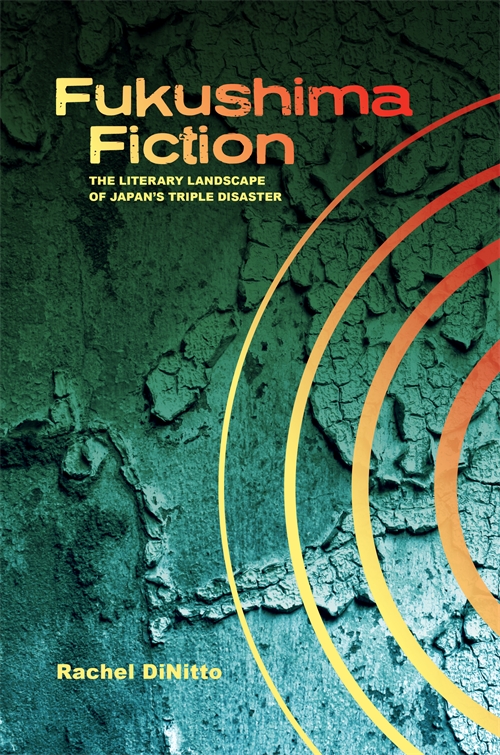Fukushima Fiction: The Literary Landscape of Japan’s Triple Disaster
Awards
- Winner of the Choice Magazine Outstanding Academic Title, 2020
- About the Book
-
Fukushima Fiction introduces readers to the powerful literary works that have emerged out of Japan’s triple disaster, now known as 3/11. The book provides a broad and nuanced picture of the varied literary responses to this ongoing tragedy, focusing on “serious fiction” (junbungaku), the one area of Japanese cultural production that has consistently addressed the disaster and its aftermath. Examining short stories and novels by both new and established writers, author Rachel DiNitto effectively captures this literary tide and names it after the nuclear accident that turned a natural disaster into an environmental and political catastrophe.
The book takes a spatial approach to a new literary landscape, tracing Fukushima fiction thematically from depictions of the local experience of victims on the ground, through the regional and national conceptualizations of the disaster, to considerations of the disaster as history, and last to the global concerns common to nuclear incidents worldwide. Throughout, DiNitto shows how fiction writers played an important role in turning the disaster into a narrative of trauma that speaks to a broad readership within and outside Japan. Although the book examines fiction about all three of the disasters—earthquake, tsunami, and nuclear meltdowns—DiNitto contends that Fukushima fiction reaches its critical potential as a literature of nuclear resistance. She articulates the stakes involved, arguing that serious fiction provides the critical voice necessary to combat the government and nuclear industry’s attempts to move the disaster off the headlines as the 2020 Olympics approach and Japan restarts its idle nuclear power plants.
Rigorous and sophisticated yet highly readable and relevant for a broad audience, Fukushima Fiction is a critical intervention of humanities scholarship into the growing field of Fukushima studies. The work pushes readers to understand the disaster as a global crisis and to see the importance of literature as a critical medium in a media-saturated world. By engaging with other disasters—from 9/11 to Chernobyl to Hurricane Katrina—DiNitto brings Japan’s local and national tragedy to the attention of a global audience, evocatively conveying fiction’s power to imagine the unimaginable and the unforeseen.
- About the Author(s)
-
Rachel DiNitto, Author
Rachel DiNitto is associate professor of Japanese literature at the University of Oregon.
- Reviews and Endorsements
-
- Rachel DiNitto has produced a major study, conveying the scope, variety, and critical import of literary responses to the triple disaster (earthquake, tsunami, and nuclear meltdown) of March 2011. Her account combines fine-grained literary analysis with a broad compass and a critical vision that illuminates the stakes of imaginative engagement with our current nuclear reality—a world in which “life with radiation is the new norm.” Her account is most compelling as it engages critically with this contested terrain of “nuclearity,” demonstrating the global relevance of Japanese writers’ attempts to come to terms with the world revealed by the Fukushima disaster.
—William O. Gardner, Swarthmore College - This brilliant and highly original book combines a close reading of literary works with an insightful analysis of the social and political context of, and media discourse about, the March 2011 “triple disaster.” It offers an overview of fictional representations of the disaster and its impact on local and global perceptions of the event, and by extension of Japanese institutions and Japanese society.
—Rebecca Suter, The University of Sydney - Fukushima Fiction may be the most important work of scholarship on Japanese culture or world literature in recent years. The book covers a topic of deep and broad interest both within and far beyond Japanese studies. DiNitto creates and opens debate about a focused group of literary works circulating after the Fukushima triple disasters. The book will push readers to understand Fukushima as a global ethical, social, and cultural crisis for which we all share responsibility and yet, like other disasters around the world, one that is very much situated within a particular local cultural milieu.
—Jonathan Abel, Pennsylvania State University - This comprehensive study of fiction . . . is captivating and enlightening. The coverage of related trenchant topics (e.g., atomic bomb literature arising from Hiroshima and Nagasaki) and of the marginalization of victims of both the atomic bombs and Fukushima is wide-ranging, each event illuminating the next. Highly recommended.
—CHOICE, 57:5 (January 2020) - Fukushima Fiction is a praiseworthy endeavor that grounds and expands the study of this body of literature while at the same time leaving many doors open for further work to be done on the subject—for example, studying the links between post-Fukushima literary representations and contemporary alternative modes of expressing dissent. Through its contestation against official positions of neglect, literature emerges as a vehicle for conveying opposition in ways that are at once emotional, affective, and intellectual. In DiNitto’s hands, this approach to Fukushima fiction, which juxtaposes its literary devices with larger sociopolitical themes, brings out the best of its potential as an agent of cultural commentary and transformation.
—Jordi Serrano-Muñoz, El Colegio de México, Monumenta Nipponica, 75:2 (2020)
- Rachel DiNitto has produced a major study, conveying the scope, variety, and critical import of literary responses to the triple disaster (earthquake, tsunami, and nuclear meltdown) of March 2011. Her account combines fine-grained literary analysis with a broad compass and a critical vision that illuminates the stakes of imaginative engagement with our current nuclear reality—a world in which “life with radiation is the new norm.” Her account is most compelling as it engages critically with this contested terrain of “nuclearity,” demonstrating the global relevance of Japanese writers’ attempts to come to terms with the world revealed by the Fukushima disaster.
- Supporting Resources
-










